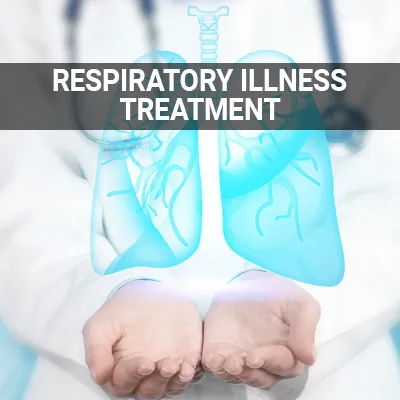Asthma Treatment Sterling, VA
Asthma is a common condition that causes abnormal coughing, wheezing, and shortness of breath. This condition affects both children and adults, and it can interfere with one's daily activities. Although asthma cannot be cured, it can be controlled and managed when taking the appropriate measures.
Asthma symptoms can surface at any age and range in severity, from mild to life-threatening. It is important to recognize asthmatic symptoms, preventative measures, and temporary relief medications to prevent an asthma attack. If the symptoms persist, the individual should seek a medical professional for an accurate and formal diagnosis in which the doctor can relay proper home care and prescribe medication.
Asthma diagnosis is available at Millennium Medical Care Stone Springs in Sterling and the surrounding area. Our staff can help you determine whether the symptoms you feel are asthma-related. Call us at (703) 665-3242 to visit our urgent care center for an evaluation and treatment today.
What is Asthma?
Asthma is a condition that results from a highly complex interaction between our immune system and the airways in our lungs. The immune system's cells create a reaction that changes the structure of the airways, resulting in a cough or wheeze. In addition, there are a variety of factors that can worsen asthma, including those passed down genetically, substances in the environment, and infections.
“To put it simply, the cells of our immune system create a reaction that changes the structure of our airways, resulting in a cough or wheeze.”
Risk Factors of Asthma
There are a variety of factors that can increase your risk of developing asthma:
- Sex — In childhood, boys tend to acquire asthma more than girls; men and women age 20-40 acquire equally; after 40, it becomes more common in females
- Early life events — Higher risk of acquiring asthma for those who had poor lung function as a newborn
- Family history — If members of your family also had or have asthma, it can be passed down to you and increase your risk
- Allergies — If you have allergies, especially if they cause symptoms that affect your breathing, your risk for asthma increases
- Pollution — If you live or grew up in an area of high pollution, the likelihood of asthma increases
- Maternal medication use — If a mother used certain medications, acetaminophen (Tylenol) or ibuprofen (Aleve), during her pregnancy, this can increase the baby’s risk of asthma
“There are a variety of factors that can increase your risk of developing asthma.”
Common Triggers of Asthma
An individual can acquire or worsen asthma in various ways, some within their control and others outside of their control. Allergies are among the most common triggers of asthma, as they cause many of the same symptoms and often result in coughing, wheezing, and shortness of breath. Infections that block the lungs are also common triggers as they tighten the chest and narrow the airways.
Although good for the body, exercise causes cold and dry air to travel to the lungs, irritating the airways. Smoking causes damage to the lungs, an essential function for people with asthma, and thus irritates the airways, making them swollen, narrow, and filled with mucus. Stress can also trigger asthma as the body's response to stress causes the release of certain hormones, leading to inflammation within the lungs' airways. Any condition or disease that blocks or irritates the throat, airways, or lungs triggers and worsens asthmatic symptoms.
“Allergies are among the most common triggers of asthma, as they cause many of the same symptoms and often result in coughing, wheezing, and shortness of breath.”
Check out what others are saying about our services on Yelp: Asthma Treatment in Sterling, VA
How an Urgent Care Physician Diagnoses Asthma
An urgent care physician requests the patient's medical history to determine whether they have asthmatic symptoms, along with any risk factors or triggers. They listen to the patient's lungs through a stethoscope, which will produce a wheezing sound in asthmatic patients. The physician also examines the throat and nose for signs that can be associated with asthma.
The physician will then test how well the lungs are working, which is called pulmonary function testing. This series of tests can pinpoint whether your breathing symptoms are due to asthma or another condition, such as emphysema or chronic obstructive pulmonary disease (COPD), which have similar symptoms but are commonly caused by smoking.
There are no laboratory blood tests available that can diagnose asthma, but if the asthma symptoms are severe, the physician may order blood tests and chest X-rays to ensure the patient does not have another infection or disease that might worsen asthma. The physician will evaluate the tests and diagnose the patient. If they are still unsure, the patient may be referred to an asthma specialist for further testing.
“Allergies are one of the most common triggers of asthma, as they cause many of the same symptoms and often resulting in coughing, wheezing, and shortness of breath.”
Questions Answered on This Page
Q. What are the risk factors associated with asthma?
Q. What are some of the common triggers of asthma?
Q. How can an urgent care physician determine if I have asthma?
Q. How can an urgent care physician treat asthma?
People Also Ask
Q. What are the symptoms of respiratory issues to watch out for?
Q. What can professional treatment do for my respiratory issues?
Q. What are some common symptoms of bronchitis?
Treating Asthma
There are three main factors a physician considers to treat asthma. First, they will need to assess the severity of asthma and how it is affecting the patient. The physician will teach them how to test their lungs' functionality with a special tool to keep track of it. They will also provide certain questions that should be reported in a journal, such as:
- How many times does your asthma wake you up at night?
- How many times have you had to go to the emergency room for your asthma?
- Has your asthma been preventing you from doing your normal activities at school or work? If so, how?
Secondly, the physician will educate the patient on how to avoid certain triggers that worsen asthma. They can help find solutions when certain triggers might be unavoidable at work, school, or home. Lastly, the physician will prescribe medication that is important to learn how and when to take. Since these medications can have side effects, the physician will prescribe the minimal amount until symptoms have improved. These medications include oral pills, inhalers, and, sometimes, a CPAP, a machine with a hose and mask that delivers constant air pressure.
It is crucial that patients completely understand their role in monitoring and treating asthma, as it can take some time to see what works for them and or change medications as needed.
“It is crucial that patients completely understand their role in monitoring and treating asthma.”
Frequently Asked Questions
Q. Why has asthma seen a dramatic increase in recent years?
A. Asthma has been more correctly diagnosed than in the past. Researchers have found that people spend more time indoors, and indoor air contains a number of asthma triggers, such as smoke, dust mites, and pet allergens. They also suspect the increase is caused by outdoor air pollution, which has also spiked in recent years.
Q. Why is asthma worse at night?
A. If you experience symptoms at night, your asthma is not being properly controlled. The circadian rhythm causes certain natural hormones (similar to those in certain asthma medications) to be at lower levels at night. These lower hormone levels slightly reduce the diameter of the airways. You could also be inhaling dust mite allergens from pillows, blankets, and mattress while sleeping. When lying down, the distribution of gravity on your chest can put extra pressure on your lungs.
Q. What are the types of asthma?
A. Adult-onset asthma is a type of asthma that surfaces in adulthood and causes flare-ups from triggers they may have avoided in the past. Allergic asthma is a type closely related to certain allergies that can trigger asthmatic symptoms such as pollen, dust, and pet dander. Exercise-induced asthma results from wheezing or coughing during exercise or physical exertion, making it difficult for you to breathe. Occupational asthma is when you experience wheezing, coughing, chest tightness, or shortness of breath at work, often from air quality.
Q. How can I prevent acquiring asthma or manage it if I do have it?
A. Understanding the type of asthma you have is important in knowing how to manage it. Many of the same methods can be used for prevention if you feel you have early signs of asthmatic symptoms. Keeping a humidifier in the house and room you sleep in can help circulate and filter the air you breathe. Taking the right medications and keeping an inhaler with you at all times can also help prevent an asthma attack.
Q. Is asthma a life-long condition?
A. In most cases, yes. Asthma is not curable but can be controlled. Occasionally, people with asthma will enjoy long periods in which they do not experience symptoms. Often, children who have asthma find that their symptoms disappear during adolescence but return when they reach adulthood.
Start Feeling Better – Visit Us Today
By visiting us as soon as possible, our team can help get you the professional treatment you need. Instead of waiting around and allowing the symptoms to get worse, we can provide you with stronger medication and treatment options instead of ineffective store-bought products.
Definitions
Visit Us Today
If you are concerned about asthmatic symptoms and want to schedule an examination, call us at 703-665-3242 . We accept walk-ins.
Helpful Related Links
- American Journal of Medicine. American Journal of Medicine. 2023
- American Medical Association (AMA). American Medical Association (AMA). 2023
- American Medical Society For Sports Medicine (AMSSM). American Medical Society For Sports Medicine. 2023
- American Trauma Society. American Trauma Society. 2023
- John Hopkins Medicine Orthopaedic Surgery. John Hopkins Medicine Orthopaedic Surgery. 2023
- National Council on Aging. National Council on Aging. 2023
- Orthopaedic Surgery: Association of American Medical Colleges. Orthopaedic Surgery: Association of American Medical Colleges. 2023
- Radiological Society of North America. Radiological Society of North America. 2023
About our business and website security
- Millennium Medical Care Stone Springs was established in 2023.
- We accept the following payment methods: American Express, Cash, Discover, MasterCard, and Visa
- We serve patients from the following counties: Loudoun County
- We serve patients from the following cities: South Riding, Brambleton, Sterling, Ashburn, and Aldie
- National Provider Identifier Database (1427061381). View NPI Registry Information
- Healthgrades. View Background Information and Reviews
- Norton Safe Web. View Details
- Trend Micro Site Safety Center. View Details
Back to top of Asthma Treatment










